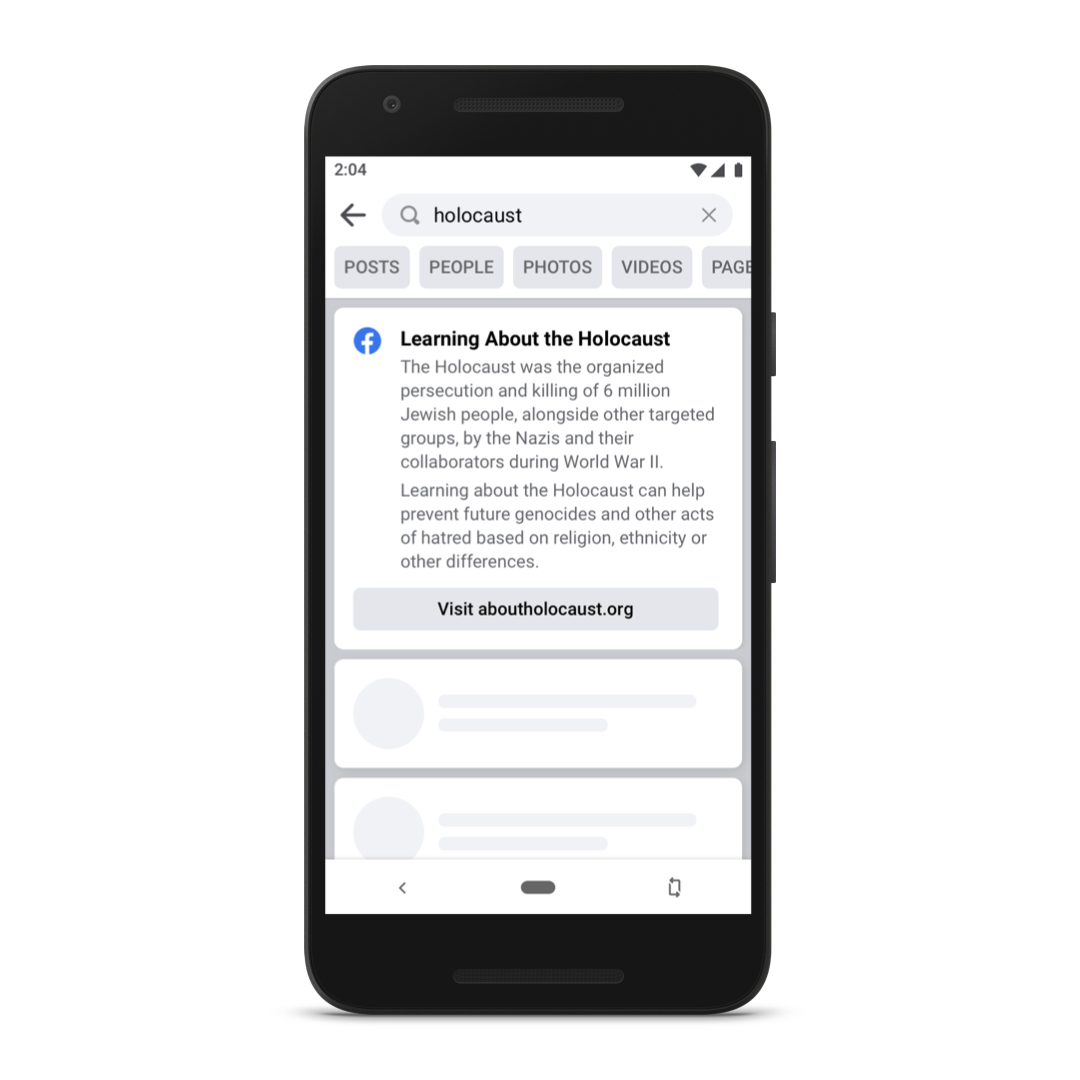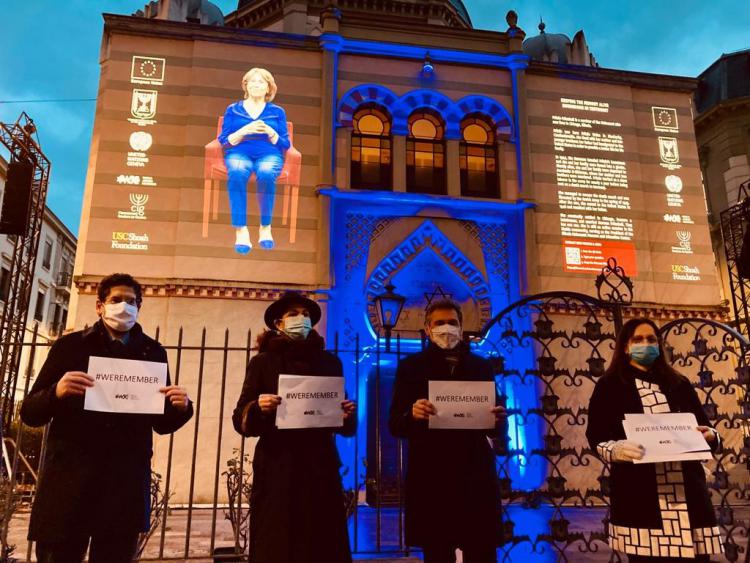Credit World Jewish Congress / Shahar Azran
This year’s observance of International Holocaust Remembrance Day was unlike that of any year prior. While normally we gather in person with friends, family, and those survivors who escaped the Nazi’s’ horrors, this year the majority of the world was forced into relative solitude as a result of the COVID-19 pandemic and ensuing lockdowns.
This sad development meant that acts of commemoration had to be carried out in a way that would engage online audiences or attract the attention of those socially-distancing around the world. These factors, combined with worldwide engagement in the World Jewish Congress’ annual #WeRemember Campaign, led to many moving, meaningful, and creative acts of collective memory.
27 January: Online Commemoration Event
WJC President Ronald S. Lauder and Auschwitz-Birkenau State Museum Director Piotr Cywinski hosted an online commemoration event on International Holocaust Remembrance Day, which featured moving remarks from Auschwitz Birkenau survivor, Tova Friedman. The event also featured video messages from H.E. Andrzej Duda, President of the Republic of Poland; H.E. Dr. Frank-Walter Steinmeier, President of the Federal Republic of Germany; and H.E. Reuven Rivlin, President of the State of Israel.
Lauder warned that “the same old lies have resurfaced,” adding, “that is why education about the Holocaust is so important, especially when so many young people have never even been told about what happened. The world needs reminding.”
International Holocaust Remembrance Day -- Virtual Commemoration from Auschwitz
Partnership with Facebook and UNESCO on Holocaust Education
Earlier that day, Facebook launched a new feature that will prompt users who search for terms associated with the Holocaust to visit AboutHolocaust.org, a website developed by the WJC and UNESCO.
This move by Facebook is the product of a long period of cooperation with the WJC as well as Facebook’s receptiveness to using its massive platform as the world’s largest social media company to ensure that its users do not fall victim to the purveyors of hate and ignorance. The feature will first be available in English-speaking countries including the United States, Canada, Australia, New Zealand, and the United Kingdom, and will be rolled out in additional languages and countries at the next stage.
Facebook’s Chief Operating Officer Sheryl Sandberg said, “I am grateful for all that the World Jewish Congress and UNESCO do to honor the six million people who were murdered just for being Jewish, the countless more who were killed for who they were, and those who survived this horrendous chapter in human history. This International Holocaust Remembrance Day we are proud to partner with them to help people learn the facts about the Holocaust and hear the stories of those who survived. At a time of rising hate and intolerance, taking time to read and reflect on what happened to Jews and others in Europe is more important than ever.”

The #WeRemember Campaign
The World Jewish Congress extends its heartfelt appreciation to the millions around the world who joined in the collective act of remembrance through the #WeRemember Campaign in commemoration of International Holocaust Remembrance Day.
The entirety of WJC’s Holocaust remembrance activities occurred under the banner of the fifth annual #WeRemember Campaign. Once again, we asked people to take to social media and use the hashtag to collectively share messages of reflection and voice support for expanded Holocaust education worldwide.
The outpouring of heartfelt and meaningful messages from nearly every continent was driven in large part by support from Jewish communities around the world as well as key institutional partners such as UNESCO. Jewish leaders, government officials, sporting clubs, and diverse faith and cultural groups led the way.
Across Facebook, Instagram, and Twitter #WeRemember was one of the leading topics online in France, Canada, Sweden, Argentina, the United States, and more. While in places of particular importance on this day, including Germany, Austria, and Israel, it was the most talked about topic.
We also began to explore the power of TikTok, a platform increasingly popular among young people today. You can see some of the incredible content produced by our social media team online.
Shining lights around the world
This year, we saw prominent locations illuminated with the #WeRemember. Ensuring our message of remembrance was nearly impossible to miss.
In Thessaloniki, a city that was home to a large and prominent Jewish community for more than two thousand years until it was all but destroyed during the Holocaust, the historic White Tower displayed a message of remembrance for those who were lost.
In Tel Aviv, Israel’s cultural capital that rose from the sandy shore that welcomed those seeking safety from antisemitism, citizens were reminded of the importance of the day with light shows at the city’s port and on the towers of Azrieli Center.
Israel’s national airline, El Al lent their support to this year’s campaign by affixing the logo to an aircraft traveling the Tel Aviv to Berlin route. The artwork will remain in place for at least the next year.
In Vienna, Austria’s Parliament initiated a moving display on the façade of the building which was occupied by the Nazis following the Anschluss.
In Berlin, once the center of the Nazi Reich under Adolph Hitler, the displays were hard to miss and incredibly meaningful, with special light shows and signs across the city. The headquarters of Germany’s Foreign Ministry bore the campaign tag at unbelievable scale.
Germany
The displays of remembrance across Germany were especially moving.
In addition to the public displays in Berlin, nearly every member of the cabinet as well as the Prime Ministers of the 16 federal states joined #WeRemember, accompanied by numerous MPs from the federal and state parliaments across all party aisles and even regular employees or trainees for government agencies showed support. German justice Minister Lambrecht motivated many of her European colleagues in a personal letter to take part. On local level, mayors and city council members of large cities and small towns took part, often including staff. Schools, teachers and classes engaged across the country.
Together with the German Jewish community, top leaders of both churches as well as Islamic organizations took part in the campaign. Board members from biggest Employers like Volkswagen or Deutsche Bahn as well as bosses of labour unions joined.
Top football teams across the Bundesliga and lower levels showed solidarity by posting #WeRemember signs on Social Media channels, with the Borussia Dortmund and Borussia Mönchengladbach taking a pre-match photo and displaying the hashtag on the illuminated message board during their live broadcast to millions of viewers.
Notable entertainers and Influencers of all kind, covering diverse issues from politics to beauty, also lent a voice for #WeRemember. Broad media coverage included an op-ed by WJC-President Ronald S. Lauder in reputable Frankfurter Allgemeine Zeitung and an extensive interview in biggest tabloid Bild, moreover a strong statement by WJCs Maram Stern in the capital’s most renowned newsletter for politics and media made the campaign an event, nobody could overlook in Germany.
Featured Initiatives and Events
The WJC, together with partners, also sponsored several other events in the run up to and on International Holocaust Remembrance Day.
January 25 – ‘Lest We Forget’ exhibition launch at UNESCO
On 25 January, in partnership with UNESCO leaders from across the world, and other institutions, WJC co-sponsored a virtual commemoration event honoring the victims and survivors of the Holocaust.
The ceremony also marked the opening of the “Lest We Forget” photo exhibition, the largest display of portraits documenting the stories of survivors of the Holocaust and other Nazi crimes around the world. The exhibition, located within the UNESCO building in Paris as well as all around the exterior fence, was created by photographer Luigi Toscano, and supported by the Permanent Delegations of Austria, France, Germany, and the European Union to UNESCO, as well as the World Jewish Congress, the Representative Council of Jewish Institutions of France (CRIF), and several other institutions.
Hosted by Karel Fracapane of UNESCO, the forum featured remarks by leaders from across the world, including a closing address by WJC President Ronald S. Lauder, who underscored that that “vigilance and remembrance, along with education are the best way for the world never to forget this crime.” Lauder also spoke of the heroism of the survivors, saying, “After everything that happened to them, after everything taken from them, their families murdered, these people displayed the most amazing courage the world has ever seen. They never sought vengeance. They walked out of those gates, they married and had children, creating families. Creating life! in the face of death they created life.”
"Lest We Forget" - Exhibition Opening & Virtual Commemoration from UNESCO
January 25 – ‘Keeping the Memory Alive’ project with UN Geneva
On 25 January, in partnership with the USC Shoah Foundation and the EU Delegation to the UN, Israel’s Mission in Geneva, the United Nations Office at Geneva, and the city’s Jewish community, the WJC co-sponsored an innovative video project entitled ‘Keeping the Memory Alive’. The video exhibit remained on the walls of the “Beth Yaacov” Great Synagogue of Geneva from 25-31, enabling those passing by pause, reflect and ask questions that prompt real-time responses from pre-recorded video interviews with Holocaust survivors

The official opening of the exhibition featured the Ambassadors of the European Union and of Israel, the Director General of UNOG, the President of the Council of the Canton of Geneva, Anne Emery-Torracinta, a representative of the CIG, and was moderated by the World Jewish Congress representative.
Stronger than Hate – Together with the European Commission and USC Shoah Foundation
Together with the European Commission and the USC Shoah Foundation, the World Jewish Congress launched a video ‘Stronger than hate - Holocaust Remembrance 2021’. The video features interviews and testimonies of hidden children from Belgium and other Holocaust Survivors addressing antisemitism today, the danger of rise of conspiracy theories amidst COVID 19, and the Shoah remembrance.
January 27 – NATO Headquarters
Wrapping up International Holocaust Remembrance Day, the partnered with the partnered with the delegations of Italy and Poland to NATO to hold an event at NATO headquarters in Brussels unveiling an art-installation “Dandelions” by Carla Chiusano, and a selection of art of former Auschwitz prisoners. During the ceremony, the flags of all 30 NATO Allies rested at half-mast.
Holocaust Remembrance Toolkit for Students
In partnership with the European Union of Jewish Students and the World Union of Jewish Students, the WJC released a new Holocaust education toolkit for students around the world.
The toolkit includes a wide array of information, educational material, and practical guidance for hosting remembrance commemorations. While launched alongside the #WeRemember campaign, the toolkit served as a useful resource for any student who plans on hosting a commemoration event throughout the year.
This year’s events for Holocaust Remembrance Day were truly like no other before, and we will continue ahead on our mission of ensuring the lessons of the Holocaust are never forgotten. Promoting Holocaust education and warning the world of the dangers of hate and misinformation are core to what we do at the World Jewish Congress.
Be sure to be on the lookout as we bring you more from the #WeRemember Campaign throughout the year. We look forward to working with you.









